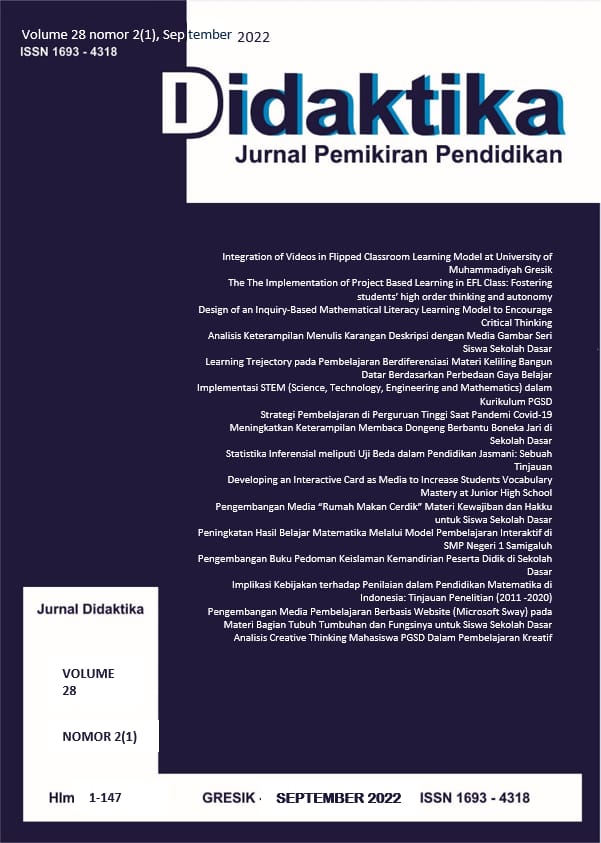Statistika Inferensial meliputi Uji Beda dalam Pendidikan Jasmani: Sebuah Tinjauan
DOI:
https://doi.org/10.30587/didaktika.v28i2.4166Keywords:
Statistik inferensial, Uji beda, Uji t, Pendidikan JasmaniAbstract
Dalam pendidikan jasmani dan olahraga tidak lepas dari variabel yang saling berkaitan dari satu dengan lainnya. Untuk menguji keterlibatan variabel dalam melakukan gerakan olahraga diperlukan perhitungan dalam bentuk statistik. Tujuan dari artikel ini adalah membahas tentang uji beda yang digunakan dalam penelitian kuantitatif dalam bidang pendidikan jasmani dan olahraga. Metode studi pustaka dengan sumber sekunder menjadi pendekatan kualitatif yang diterapkan dalam penelitian ini. Stastistik yang digunakan dalam penelitian kuantitatif biasanya menggunakan jenis statistik inferensial. Statistik inferensial dibedakan menjadi dua yakni statistik parametrik dan nonparametrik. Uji t atau disebut dengan uji beda termasuk salah satu statistika parametrik (inferensial) yang digunakan untuk mengetahui ada tidaknya perbedaan rata-rata skor antara dua kelompok (sampel). Terdapat prosedur yang diperlukan dalam menganalisis data dengan menggunakan uji beda antara lain: (1) membuat hipotesis, (2) membuat tabel penolong, (3) menghitung t hitung, (4) menguji dengan t tabel, dan (5) menarik kesimpulan. Uji beda cenderung digunakan dalam penelitian eksperimental.
References
Budiwanto, S. (2004). Teknik Analisis Statistika. Malang: FIK UM.
Budiwanto, S. (2017). Metode Statistika untuk Mengolah Data Keolahragaan. Malang: FIK UM.
Creswell, J. W., & Creswell, J. D. (2018). Research Design: Qualitative, Quantitative, and Mixed Methods Approaches (5th ed.). California: SAGE Publications, Inc.
Djarwanto. (2001). Mengenal Beberapa Uji Statistik dalam Penelitian. Yogyakarta: Liberty Yogyakarta.
Djudin, T. (2013). Statistika Parametrik - Dasar Pemikiran dan Penerapannya dalam Penelitian. Yogyakarta: Tiara Wacana.
Kurniasih, N. D. (2013). Pengaruh Latihan Beban Terhadap Hasil Servis Atas Pada Peserta Ekstrakurikuler Bolavoli Putra SMP Negeri 1 Mandiraja Kabupaten Banjarnegara. Yogyakarta: FIK UNY.
Miles, M. B., Huberman, A. M., & Saldaña, J. (2014). Qualitative data analysis: a methods sourcebook (3rd ed.). Los Angeles: SAGE Publications.
Mustafa, P. S. (2017). Analisis Uji R Berganda dan Uji Lanjut dalam Statistik Inferensial pada Penelitian Pendidikan Jasmani. Pascasarjana Universitas Negeri Malang, 1–23.
Mustafa, P. S. (2021). Implementation of Behaviorism Theory-based Training Learning Model in Physical Education in Class VII Junior High School Football Game Materials. COMPETITOR: Jurnal Pendidikan Kepelatihan Olahraga, 13(1), 39–60. https://doi.org/https://doi.org/10.26858/cjpko.v13i1.18131
Mustafa, P. S., Winarno, M. E., & Asim. (2016). Pengembangan Variasi Latihan Service Atas untuk Peserta Ekstrakurikuler Bolavoli di SMK Negeri 4 Malang. Jurnal Pendidikan Jasmani, 26(1), 159–175. https://doi.org/http://dx.doi.org/10.17977/pj.v26i1.7740
Nurgiyantoro, B., Gunawan, & Marzuki. (2017). Statistik Terapan untuk Penelitian Ilmu Sosial (Teori & Praktik dengan IBM SPSS Statistic 21). Yogyakarta: Gadjah Mada University Press.
Pratama, O. (2014). Perbedaan Kapasitas VO2max pada Pemain Sepakbola Perokok dan Tidak Perokok di PS FKIP Universitas Bengkulu. Bengkulu: FKIP Universitas Bengkulu.
Rangkuti, A. A. (2017). Statistik Inferensial untuk Psikologi Pendidikan. Jakarta: Kencana Pranada Media.
Riduwan, & Sunarto. (2013). Pengantar Statistika untuk Penelitian Pendidikan, Sosial, Ekonomi, Komunikasi, dan Bisnis. Bandung: Alfabeta.
Siregar, S. (2015). Statistika Terapan untuk Perguruan Tinggi. Jakarta: Prenadamedia Group.
Sudaryono. (2012). Statistika Probabilitas: Teori & Aplikasi. Yogyakarta: Andi Yogyakarta.
Sugiyono. (2015). Statistika untuk Penelitian. Bandung: Alfabeta.
Winarno, M. E. (2013). Metodologi Penelitian dalam Pendidikan Jasmani. Malang: Universitas Negeri Malang.
Downloads
Published
How to Cite
Issue
Section
License
License and Copyright Agreement
In submitting the manuscript to the journal, the authors certify that:
- They are authorized by their co-authors to enter into these arrangements.
- The work described has not been formally published before, except in the form of an abstract or as part of a published lecture, review, thesis, or overlay journal.
- That it is not under consideration for publication elsewhere,
- That its publication has been approved by all the author(s) and by the responsible authorities – tacitly or explicitly – of the institutes where the work has been carried out.
- They secure the right to reproduce any material that has already been published or copyrighted elsewhere.
- They agree to the following license and copyright agreement.
Copyright
Authors who publish with DIDAKTIKA: Jurnal Pemikiran Pendidikan agree to the following terms:
- Authors retain copyright and grant the journal right of first publication with the work simultaneously licensed under a Creative Commons Attribution License (CC BY-SA 4.0) that allows others to share the work with an acknowledgment of the work's authorship and initial publication in this journal.
- Authors are able to enter into separate, additional contractual arrangements for the non-exclusive distribution of the journal's published version of the work (e.g., post it to an institutional repository or publish it in a book), with an acknowledgment of its initial publication in this journal.
- Authors are permitted and encouraged to post their work online (e.g., in institutional repositories or on their website) prior to and during the submission process, as it can lead to productive exchanges, as well as earlier and greater citation of published work.
Licensing for Data Publication
Open Data and Software Publishing and Sharing
The journal strives to maximize the replicability of the research published in it. Authors are thus required to share all data, code or protocols underlying the research reported in their articles. Exceptions are permitted but have to be justified in a written public statement accompanying the article.
Datasets and software should be deposited and permanently archived inappropriate, trusted, general, or domain-specific repositories (please consult http://service.re3data.org and/or software repositories such as GitHub, GitLab, Bioinformatics.org, or equivalent). The associated persistent identifiers (e.g. DOI, or others) of the dataset(s) must be included in the data or software resources section of the article. Reference(s) to datasets and software should also be included in the reference list of the article with DOIs (where available). Where no domain-specific data repository exists, authors should deposit their datasets in a general repository such as ZENODO, Dryad, Dataverse, or others.
Small data may also be published as data files or packages supplementary to a research article, however, the authors should prefer in all cases a deposition in data repositories.











